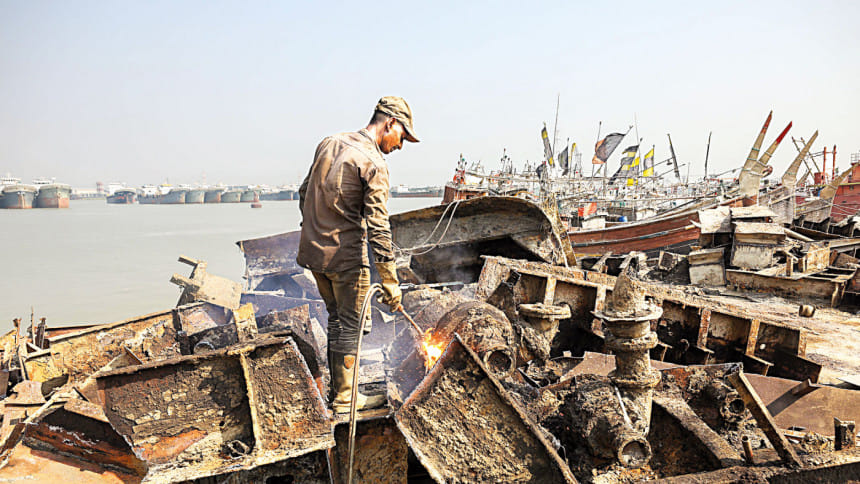Shipbreaking goes on without environmental clearance

Defying law, shipbreakers in Chattogram are breaking scrap vessels without obtaining clearance from the Department of Environment (DoE), putting the environment at risk.
DoE has fined and warned seven shipbreakers in the last four months.
Ferdous Anwar, deputy director of the DoE Chattogram district office, told The Daily Star that "Despite repeated requests, shipbreakers are not bothering to get environmental clearance."
According to the DoE, two shipbreakers were fined Tk 1 lakh and five others were warned and told to get clearance as per the law before recycling ships.
To prevent environmental pollution, any vessels scheduled for dismantling must have clearance under Section 19 (1) of the Hazardous Wastes and Shipbreaking Waste Management Rules, 2011, as ships also contain a wide range of hazardous wastes.
As per the laws, the details of the recycling process of the scrap ships and the management of wastes, including asbestos, glassholes, lubricant wells, and various other harmful materials, have to be mentioned in the application for that clearance.
"Upon receiving the application, we inspect the vessel and issue the clearance certificate with instructions to dispose of the toxic waste as per law," said Ferdous Anwar, deputy director of the DoE.
According to the Bangladesh Ship Breakers and Recyclers Association (BSBRA), there are 40 ship-breaking yards in Bangladesh, and around 20,000 people work in these yards.
Contacted, Abu Taher, president of the BSBRA, told The Daily Star "We have recently held a meeting about the issue and written to all yard owners directing them to obtain clearance from DoE before scrapping ships."
Experts said shipbreaking without environmental clearance is a threat to both the terrestrial and marine environment as well as human health.
Dr Prabal Barua, who has been researching the effects of pollution caused by shipbreaking in the last decade, told The Daily Star "Usually scrap ships are broken up in our country without proper disposal of hazardous waste."
Ship scrapping activities have already affected the physicochemical properties of seawater, inter-tidal sediments and soils, and the biodiversity of Bangladesh.
Scraping ships without environmental clearance will accelerate the destruction of the environment as scrap ships are filled with hazardous waste, he warned.
However, Ferdous Anwar, deputy director of the DoE, said they will take tougher actions if shipbreakers continues to show disregard to laws.
"We have warned shipbreakers that they would be prosecuted if they cut ships without environmental clearance."

 For all latest news, follow The Daily Star's Google News channel.
For all latest news, follow The Daily Star's Google News channel. 



Comments